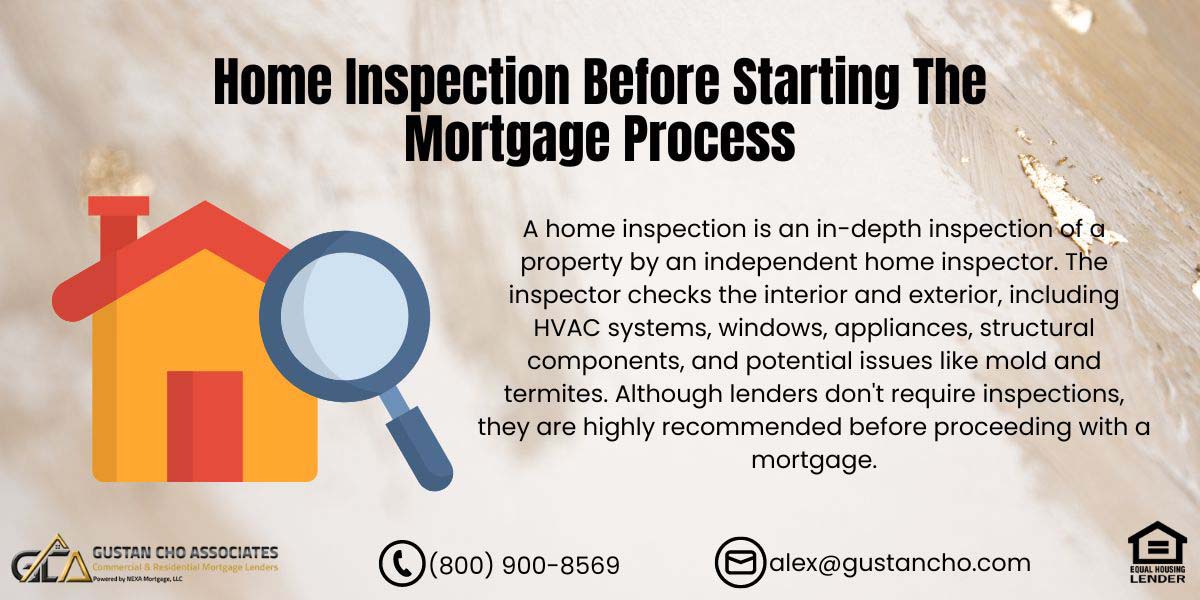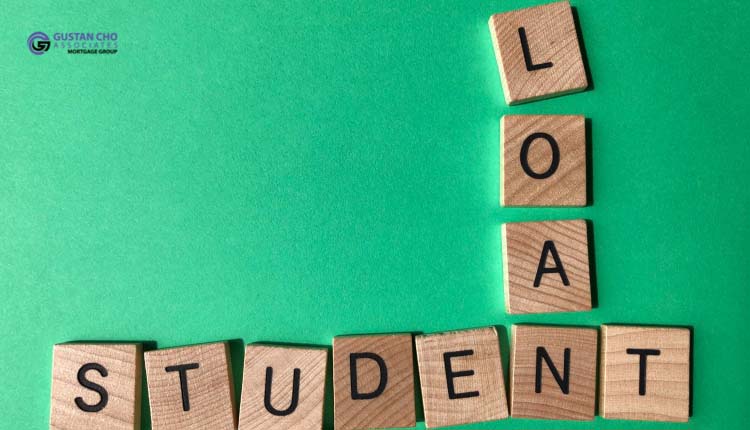This guide covers home inspection before proceeding with the mortgage process. A home inspection is an inspection of a home purchased by home buyers where they hire an independent home inspector to go over the subject property with a fine toothcomb. Lenders do not require home inspections. It is voluntary for the buyers to have an inspection done. However, it is highly recommended. Home inspections are done before the home appraisal. This article will discuss the importance of property inspection before proceeding with the mortgage process.
Home Inspection Process
The majority of inspectors have the same home inspection process. The inspection depends on the individual inspector and the policies of the company. Inspectors will normally inspect any minor as well as major defects that he or she finds on the home they inspect. They will note whether the inspection item they inspect is functional and in good working order. If the subject needs a specialist, the inspector will note the concern and recommend hiring one. For example, if the home inspector notices a potential problem on a well, he may not have the concerns that he recommends a good inspection. The home inspection report is normally ready a few days after the site inspection.
Thinking About Buying a Home? Get a Home Inspection Before Starting Your Mortgage Process!
Contact us today to learn how to schedule your home inspection and ensure a smooth mortgage process.What A Home Inspection Entail
Home inspectors will generally inspect both the interior and exterior of the home such as the following:
- HVAC systems
- windows
- appliances
- millwork
- kitchens
- bathrooms
- attic
- basement
- exterior siding
- roofing
- gutters
- foundation
- inspect the house for general mold and termites
A home inspector is not an expert in all areas. Home inspectors are generally knowledgeable in basics where. If the home inspector sees a potential problem with an item in the home, the inspector will note it in his report and recommend that a specialist take a different look.
Do Mortgage Lenders Require a Home Inspection?
A property inspection is not required by mortgage lenders unless an appraisal notes on his appraisal report about issues on the home, where then the mortgage lender can require an inspection. A property inspection is highly recommended for all home buyers. Inspections are normally done before the appraisal. If a home buyer does not like the inspection report, then buyers can back out and cancel the real estate purchase transaction. A typical inspection normally costs between $300 and $500, depending on the county and state of the subject property.
What Does Inspection Mean in Mortgage?
In a mortgage, an inspection usually refers to a specific assessment or check conducted on the purchased property. As you consider purchasing a property, it’s important to be aware of the home’s physical condition. The home inspection is a common inspection that can provide you with this valuable information.
During a home inspection, a licensed inspector checks various aspects of the house, such as the structural integrity, roofing, foundation, HVAC systems, plumbing, and electrical systems, to identify any potential issues that might need repair or could affect the property’s value.
While a home inspection is primarily for the buyer’s benefit, it can influence the mortgage process. For example, suppose significant problems are uncovered during the inspection. As a buyer, it is crucial to understand that negotiating repairs with the seller, requesting a price reduction, or withdrawing the offer are all viable options if necessary. Remember that certain loans, such as those insured by the FHA or VA, may have property standards that must be met, which could require an inspection to ensure compliance.
Is a Home Inspection and Appraisal the Same Thing?
It’s important to understand that a home inspection and appraisal differ. These two processes serve different purposes and are typically conducted by different professionals.
- Home Inspection: This is performed by a licensed home inspector and focuses on the home’s condition. The inspector assesses the structural integrity and the state of the heating system, plumbing, electrical systems, and other house components to identify any defects or issues. The goal of a home inspection is to provide the buyer with a detailed report on the home’s condition, highlighting any repairs that may be necessary.
- Appraisal: A licensed appraiser conducts an appraisal to ensure the lender’s property valuation is accurate. The appraiser evaluates the home’s location, condition, and comparable properties to estimate its market value. This helps the lender decide on the appropriate mortgage amount to offer since it must not exceed the home’s value.
Both processes are crucial in home buying but cater to different needs: the inspection for assessing the property’s physical condition and the appraisal for establishing its market value.
What is the Biggest Red Flag in a Home Inspection?
Significant structural damage is one of the biggest red flags in a home inspection. This can include issues such as:
- Foundation problems: Cracks or shifts in the foundation can lead to major structural instability.
- Roof damage: Significant deterioration or improper installation can result in leaks and water damage.
- Water damage: Past or current leaks can cause mold, rot, and structural issues in the home.
- Electrical issues: Outdated wiring, insufficient electrical service, aluminum wiring, or improper DIY electrical work can pose a fire hazard.
- Plumbing problems: Old or failing plumbing can lead to water damage and costly repairs.
These issues often require extensive and expensive repairs and can indicate potential safety hazards. Addressing these problems early is crucial to avoiding further damage and ensuring the home’s safety.
Ready to Buy a Home? Make Sure to Get a Home Inspection Before Starting the Mortgage Process!
Reach out now to get tips on when to schedule your inspection and how it can streamline your mortgage process.Wear and Tear Home Inspection
Normally estimate the longevity of the functionality and the age of the item inspected, such as HVAC units, leaks, wiring and electrical, mold, termites, roofing, gutters, soffits, fascia, foundation, windows, and other items. Specialty defects such as well and septic will be noted on the home inspection report. The home inspector may recommend a special inspection be done if it is a specialty defect.
Home Inspection of Safety and Hazard Issues
Home inspectors will also check for hazards and inspect for safety issues. Home inspectors will check for items that are not visible to the average human eye. They have tools to test for mold and structural issues. Appliances and the remaining life of the appliances will also be checked, and will note if the appliances need to be replaced soon. Pest control inspection and mold remediation inspectors are separate home inspection specialists. If buyers want a full detailed report, they need to hire these specialists separately, aside from the general home inspector.
Why Hire a Home Inspector?
There are a lot of costs and fees in the home-buying process. Many buyers want to save every nickel and dime on moving costs and new furniture. However, a home purchase is probably a person’s biggest investment. A home inspection should be considered an insurance policy protecting one’s investment. Many sellers will window-dress their homes before listing them in the market. All homes will look like everything is functional and in mint condition. However, there could be many issues with the subject property that are not visible to the naked eye.
Hiring a Home Inspection and Home Inspection Company
A home inspector is a professional who knows exactly where to look and what items to look for in inspecting properties. Things that are revealed by many inspectors that surprise buyers are prior water damage, foundation cracks, prior termite damage, and mold behind the drywall that is not visible to the human eye. Other issues inspectors reveal are homes that are not properly insulated or ventilated. Also, work that has been done without proper building permits and which are safety hazards will be revealed.
How Long Does Mortgage Approval Take After Appraisal?
After an appraisal is completed, the mortgage approval process typically takes a few days to a few weeks. As you go through this process, it’s important to understand that the lender will carefully review the appraisal report to ensure that the property’s value justifies the loan amount.
Simultaneously, they verify the accuracy of all financial information provided against their underwriting criteria. If any discrepancies or issues arise during the appraisal, further review or adjustments may be needed, which can extend the timeline.
Underwriting is another crucial step where the lender reviews your income, credit, and property details. This can be quick if your documentation is complete and accurate but may be delayed if additional verification or documents are required. Once you have fulfilled all the requirements, your lender will grant final approval and provide a “clear to close” status, indicating that everything is for the closing phase.
During this stage, closing arrangements are made, including scheduling the signing of the final documents and coordinating the funds’ disbursement. To help speed up this process, it’s beneficial to promptly respond to any lender requests for additional documentation or clarification. Delays often occur due to appraisal issues, discrepancies in application data, or missing documents.
Home Inspection Before Starting The Mortgage Process FAQ
- What is a home inspection? A home inspection is an in-depth inspection of a property by an independent home inspector. The inspector checks the interior and exterior, including HVAC systems, windows, appliances, structural components, and potential issues like mold and termites. Although lenders don’t require inspections, they are highly recommended before proceeding with a mortgage.
- How is a home inspection different from an appraisal? Home inspections and appraisals are both crucial in the home-buying process. Inspections identify necessary repairs and ensure you know the property’s condition, while appraisals determine the property’s market value. Prioritize both to ensure your financial stability in the long run.
- Do mortgage lenders require a home inspection? When purchasing a home, it’s important to note that many mortgage lenders will only require a home inspection if significant issues are found during the appraisal process. However, buyers are strongly advised to conduct an inspection to fully understand the property’s condition. This can influence negotiations and the decision to finalize the purchase.
- What does an inspection mean in a mortgage context? An inspection assesses the property’s condition in a mortgage context. Buyers must be aware of any issues that might need repair, as these can affect the property’s value and the buyer’s willingness to proceed with the purchase.
- What are the major red flags in a home inspection? Significant structural damage, including foundation problems, roof and water damage, outdated or hazardous electrical systems, and failing plumbing, is a major red flag. Detecting these issues early through a comprehensive inspection is crucial since they can be costly to repair and present safety risks.
- Why hire a home inspector? Hiring a home inspector is crucial as it acts like an insurance policy for your investment. Inspectors can uncover issues not visible to the untrained eye, such as water damage, structural defects, and safety hazards. A home is likely one of the largest purchases. Hence, a detailed inspection ensures you know of potential problems before committing.
- How much does a typical home inspection cost? When considering purchasing a property, it’s important to factor in the cost of a home inspection. Depending on the location and size of the property, a home inspection typically costs between $300 and $500. It is a valuable investment because it comprehensively evaluates the property’s condition, giving you the assurance you need.
- What should I do if I find issues during the home inspection? Suppose significant problems are identified during the inspection. In that case, you have several options, including negotiating with the seller for repairs, asking for a price reduction, or even withdrawing your offer. These steps can protect you from unforeseen expenses and ensure the property meets your expectations.
- How long does mortgage approval take after an appraisal? After the appraisal, the mortgage approval can take a few days to a few weeks, depending on the underwriting process. This includes reviewing the appraisal, verifying financial information, and resolving discrepancies. Prompt communication with your lender can help expedite this process.
- What are safety and hazard issues checked during a home inspection? Inspectors look for a variety of safety and hazard issues, including structural integrity, mold presence, and appliance functionality. They use specialized tools to detect problems not visible to the average person, ensuring a comprehensive property safety evaluation.
If you have any questions about Home Inspection Before Starting The Mortgage Process or you need to qualify for loans with a lender with no overlays, please contact us at 800-900-8569. Text us for a faster response. Or email us at alex@gustancho.com. The team at Gustan Cho Associates is available 7 days a week, on evenings, weekends, and holidays.
Related> Hiring a home inspector
This blog about Home Inspection Before Starting The Mortgage Process was updated on April 30th,2024.











Thank you for underlining that one of the many benefits of home inspection services is that they will determine the condition of our home. My sister bought a new house and she will be moving in soon. However, I will get her to hire a home inspection service to ensure the condition is well. I like to thank Michelle McCue of Gustan Cho Associates for referring me to the best home inspectors in the Chicagoland area.
My sister would like to buy a residential house this year, which is why she’s thinking of having it inspected for radon too since the latter may cause a tremendous health issue. Well, you made a pretty good point that inspection is highly recommended. Anyhow, thank you for sharing here that this must be done before the appraisal too. I want to purchase a Condotel in Daytona Beach, Florida. I just paid off my home loan and looking for a Vacation home. I found one that I like, so I am very interested in getting some financing. Thanks,
Excellent writing! We can take away a lot of important information from this article. Keep sharing great posts.
http://www.accessdoorsandpanels.com/